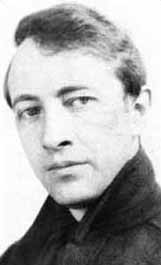Floyd Dell was born in Pike County, Missouri, in a poor family. He had to leave school early and work in a factory. Influenced early by William Morris and Frank Norris, Dell joined the Socialist Party at 16. He later worked as a newspaperman, first as a reporter for the Davenport Times, then as Editor of the Friday Literary Review, in which he promoted the works of people like Upton Sinclair, Theodore Dreiser and Stephen Crane. He firmly believed that literature could help bring about social reform. In 1914 he moved to New York and worked with Max Eastman in editing the radical journal The Masses.
|
|
In his autobiography, Homecoming, Dell writes:
Nobody gained a penny out of the things published in the magazine; it was an honour to get into its pages, an honour conferred by vote at the meetings. Max Eastman and I did get salaries for editorial work; but that was regarded as dirty work, which ought to be paid for. We were actually a little republic in which, as artists, we worked for the approval of our fellows, not for money.
Curiously, John Cowper did not like him much, seemed a bit jealous of Dreiser's strong friendship with Dell, and made some disparaging remarks. The kindest remark he seems to have made about Dell was:
Floyd Dell wrote a huge and laudatory review of my book [The War and Culture] in his paper The Masses. But O God what a queer costume he puts on when he goes out to an evening party—a flannel shirt and white flannel trousers. He does look an ass, I can tell you! They are a weird set, these New York Latin Quarterists. (Letters to His Brother Llewelyn, 8 December 1914)
Dell had known Dreiser ever since the beginning of his literary life, and was instrumental in revising Dreiser's monumental The Genius when he became editor of The Masses. He wrote jokingly:
I saw something of Theodore Dreiser, who was in Chicago for a while; he said I was the best critic in America; but I had said he was a great novelist, so it was only natural for him to think well of my critical powers.
(He had written a full-page review on Jennie Gerhardt (1911) in the Chicato Evening Post, saying in effect: "I may say, without saying it in vain: this is a great book.")
He recruited promising writers such as Sherwood Anderson, Dorothy Day and Carl Sandburg. In 1916 he was also involved in the Provincetown Theatre Group (an experimental group of American actors and directors founded in 1916 by Susan Glaspell) and one of his plays was performed by the group. Edna St Vincent Millay, John Reed, Eugene O'Neill, Louise Bryant were also part of that theatre group, either as actors or writers. The group finally disbanded in 1929, but had fulfilled their aim which was to give American playwrights a chance to work out their ideas in freedom.
Like many other people working for The Masses, Dell was opposed to the involvement of the United States in WW1. Legal action was taken in 1917 against the newspaper and the people who published it were tried. The jury failed twice to agree on their guilt but the newspaper had eventually to cease publication. After the war, Dell, Max Eastman, John Reed and Art Young took part in the publication of The Liberator, a newspaper similar to The Masses.
In 1920 Floyd Dell wrote an autobiographical novel Moon-Calf, which was a best-seller. He also wrote other novels, and non-fiction works, such as Homecoming, his autobiography (1933).
|
